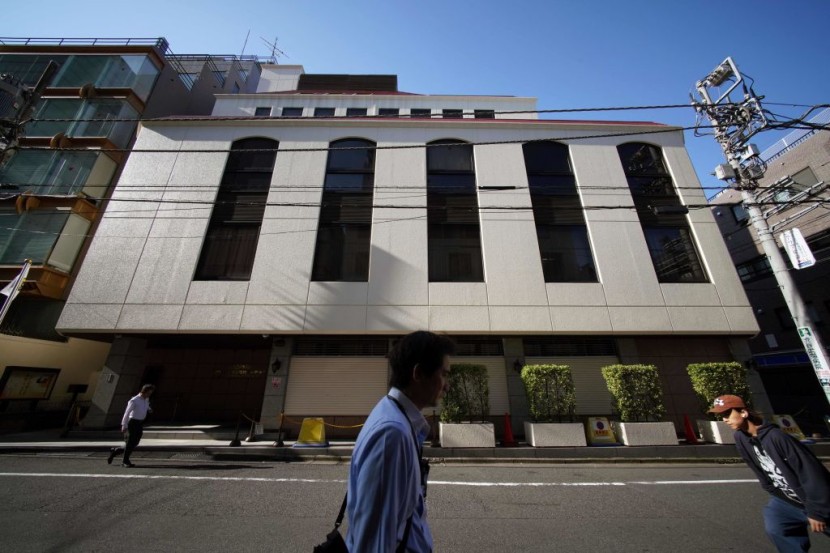
(Photo: by KAZUHIRO NOGI/AFP via Getty Images) This general view shows the Tokyo headquarters of the Family Federation for World Peace and Unification, known as the Unification Church, in the Shibuya Ward of Tokyo on October 13, 2023.
After learning that the Unification Church has been using systematic deception to coerce members into giving money, instilling fear in them, and causing harm to their families for decades, the Education Ministry recommended that Japan's government approach a court to revoke the organization's legal standing on Friday.
The church's status as a religious organization is being revoked, according to the request made to the Tokyo District Court, according to NBC News.
Officials from the Education Ministry provided the court with 5,000 pieces of documentation and proof in cardboard boxes to back up their request.
It would take some time because the process involves hearings and appeals from both sides. The church may still function if the order is approved, but it would lose its tax-exempt status as a religious institution and would suffer financial hardships.
The request was submitted the day after Education Minister Masahito Moriyama declared that a panel of experts had approved the revocation request in light of the conclusions of the ministry's inquiry into the church's fundraising strategies and other issues.
The Family Federation for World Peace and Unification, the official name of the South Korean church with a branch in Japan, has already denounced the move by the government.
Harmful Fundraising Practices
More than 170 persons were interrogated as part of the Education Ministry's inquiry into claims that the church's fundraising practices and other issues caused harm to them. Throughout the seven inquiries, the church did not answer dozens of queries, Moriyama claimed on Thursday.
According to Moriyama, the church made an effort to influence the choices of its members by employing deceptive methods, pressuring them to make donations and buy expensive items beyond their means while also inflicting fear and suffering on them and their families.
He claimed that the strategies significantly strayed from the law on religious organizations, which states that the goal of the churches' legal standing is to provide people with peace of mind.
According to the Civil Code, "the activities are wrongful conducts, and their damages are enormous."
While settlements made in or out of court totaled 20.4 billion yen ($137 million) and involved 1,550 persons, the Agency for Cultural Affairs discovered 32 examples of civil litigation conceding losses totaling 2.2 billion yen ($14.7 million) for 169 people.
Because of the lessons learned from the prewar and postwar suppression of freedom of religion and ideas, Japan has put barriers in place to restrict religious activities.
The Assassination of Shinzo Abe
After the death of the previous prime minister, Shinzo Abe, last year, there were months of public indignation and inquiries over the organization's recruitment and fundraising strategies. The man suspected of killing Abe apparently did so because of the former prime minister's affiliation with the church, which he held responsible for his family's financial ruin.
Since Abe's murder, decades-long close ties between the church and Japan's ruling Liberal Democratic Party have come to light, which has weakened support for Prime Minister Fumio Kishida's administration.
In response to rumors that the administration was trying to boost waning public support, Kishida assured reporters on Thursday that the decision to request the revocation order was thoroughly considered, based on facts, and not political.
In the midst of an anti-communist struggle backed by Abe's paternal grandpa, former Prime Minister Nobusuke Kishi, the Unification Church received official recognition as a religious institution in Japan in 1968.
The church acknowledges that there are too many gifts, but claims that the issue has been resolved for more than ten years. It has also promised to make more improvements.
According to experts, the majority of the church's global funding comes from Japan, and Japanese adherents are expected to make reparations for the crimes committed by their ancestors during Japan's colonial rule of the Korean Peninsula from 1910 to 1945.
The church would be the first to have its status withdrawn under civil law. The doomsday cult Aum Shinrikyo, which launched a sarin gas attack on the Tokyo subway, and the Myokakuji organization, whose directors were found guilty of fraud, were two earlier examples that entailed criminal accusations.
Related article: Japan and UK Team Up to Develop Next-Gen Nuclear Technology








